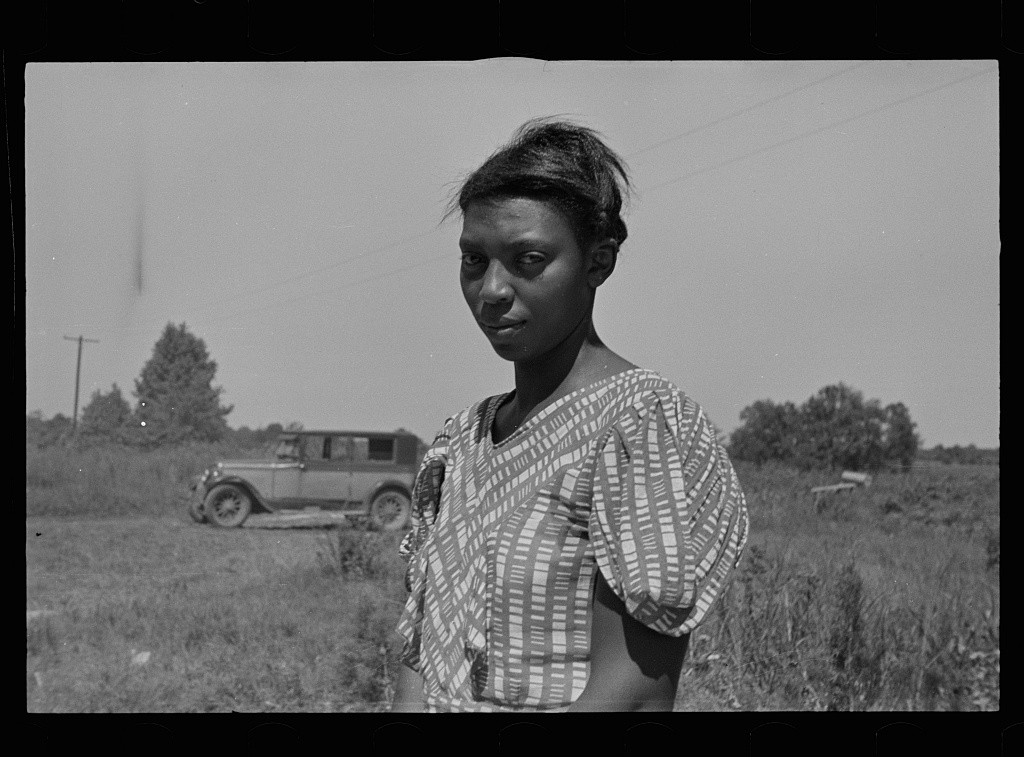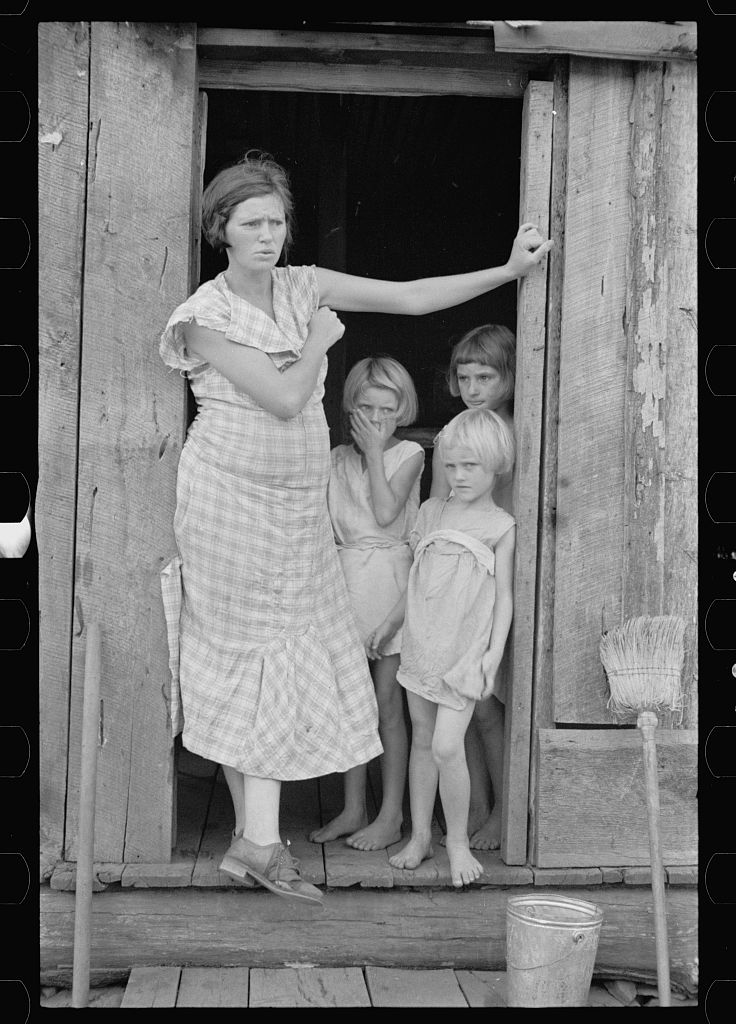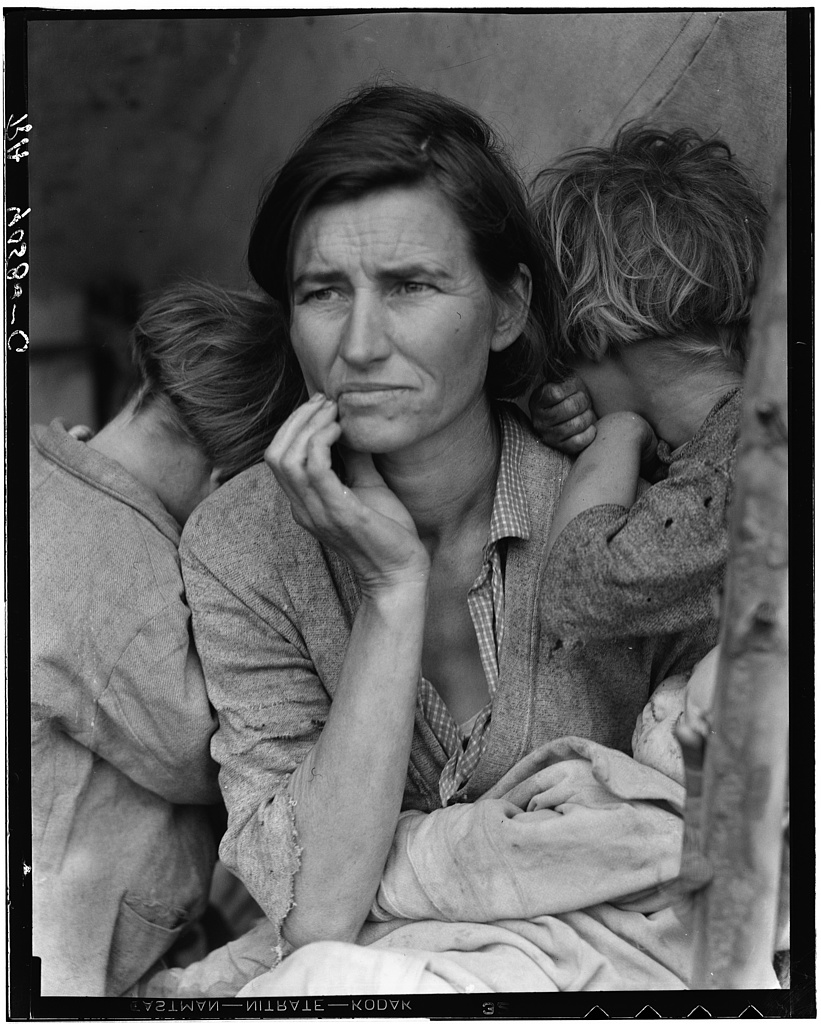 During the Great Depression, The Farm Security Administration—Office of War Information (FSA-OWI) hired photographers to travel across America to document the poverty that gripped the nation, hoping to build support for New Deal programs being championed by F.D.R.‘s administration.
During the Great Depression, The Farm Security Administration—Office of War Information (FSA-OWI) hired photographers to travel across America to document the poverty that gripped the nation, hoping to build support for New Deal programs being championed by F.D.R.‘s administration.
Legendary photographers like Dorothea Lange, Walker Evans, and Arthur Rothstein took part in what amounted to the largest photography project ever sponsored by the federal government. All told, 170,000 photographs were taken, then catalogued back in Washington DC. The Library of Congress became their eventual resting place.
We first mentioned this historic project back in 2012, when the New York Public Library put a relatively small sampling of these images online. But today we have bigger news.
Yale University has launched Photogrammar, a sophisticated web-based platform for organizing, searching, and visualizing these 170,000 historic photographs.
The Photogrammar platform gives you the ability to search through the images by photographer. Do a search for Dorothea Lange’s photographs, and you get over 3200 images, including the now iconic photograph at the bottom of this post.
Photogrammar also offers a handy interactive map that lets you gather geographical information about 90,000 photographs in the collection.
And then there’s a section called Photogrammar Labs where innovative visualization techniques and data experiments will gradually shed new light on the image archive.
According to Yale, the Photogrammar project was funded by a grant from the National Endowment for the Humanities (NEH). Directed by Laura Wexler, the project was undertaken by Yale’’s Public Humanities Program and its Photographic Memory Workshop. You can learn more about the genesis of the project and its technical challenges here.

Top image: A migrant agricultural worker in Marysville migrant camp, trying to figure out his year’s earnings. Taken in California in 1935 by Dorothea Lange.
Second image: Allie Mae Burroughs, wife of cotton sharecropper. Photo taken in Hale County, Alabama in 1935 by Walker Evans.
Third image: Wife and children of sharecropper in Washington County, Arkansas. By Arthur Rothstein. 1935.
Fourth image: Wife of Negro sharecropper, Lee County, Mississippi. Again taken by Arthur Rothstein in 1935.
Bottom image: Destitute pea pickers in California. Mother of seven children. Age thirty-two. Taken by Dorothea Lange in Nipomo, California, 1936.
Related Content:
Found: Lost Great Depression Photos Capturing Hard Times on Farms, and in Town
Download for Free 2.6 Million Images from Books Published Over Last 500 Years on Flickr
The Getty Adds Another 77,000 Images to its Open Content Archive
The Finland Wartime Photo Archive: 160,000 Images From World War II Now Online





Wonderful insight into the great deppression BUT: “Wife of negro sharecropper”…seriously? Is that how people should be described in 2014? Even if the picture dates back to 1935. We needn’t use that terminoligy.
It’s an accurate and non-offensive description. Depression is spelled with one “P” .
I think that might simply be the original given title of the photograph, from the photographer himself, hence the datedness of the description. Offensive to modern sensibilities, yes, but nevertheless an inseparable part of the historical record that formed those sensibilities.
Negro simply means black, It’s not a put down. These folks have been referred to as Negros, Blacks, and now African-Americans. I do not refer to myself as an English-American. I was born here as were most of them. We are all Americans. A little hyper-sensitive aren’t we? This term, I’m sure as someone said below that it was how the picture was described back in the 1930’s.
Bravo — someone gets it!
The distance between Negro and Nigger is vast.
Political correctness strikes again. It would be different if the word “nigger” was used, as that is an insulting word, however when a black person calls another black person that word it is socially acceptable in the eyes of most black folks and progressives/liberals. I think people need to make up their minds and be consistent. Further more I would expect people who consider themselves academic elitist whether they outwardly and openly refer to themselves as such or not sure as hell act like it would understand that “negro” is Spanish for black. Do the political correctness police find it offensive to call a black man black? I can tell you from experience a black man will be more offended if you don’t see him for who he is and everything that makes him unique as an individual. Yes, we are all human, but we have unique characteristics that make us all special and why should any person take any part of any other human being’s unique traits away from that person(s)? Which leaves one to question if it is just something so deeply rooted in the left wing progressive agenda to exploit people ‑any people- for political gain.
These are probably original titles for the photos that the photographers labeled the photos as. It should be “ok” for NPR to report history as it was recalled by the people who recorded. Lets not mute the voice of history to make it more palatable for those who can’t understand the road that brought us here.
Illustrates lack of family planning and contraceptive services available to women and men, back in the day, this problem of too many babies and poverty persists to this day. It is a perineal problem of the culture wars.
Thanks to Yale for posting the documentary photos.
How very liberally progressive of you to have such a view. How about family planning be the conscience decision of taking personal responsibility!
thank you for this posting, however it was originally described, because it became history the moment it was created and categorized.
Oh for Christ’s sake: history is history. It’s not like anyone is treating someone indignantly today. Stop “whitewashing” the past. Just like those “offensive” animated cartoons: I watch them all the time, I’m not white, it’s not like anyone is taking digs at today’s people of color. Get over it.
Exactly. I distinctly remember “colored” being used as the “polite” way to describe African-Americans back in the 1960s. Fast-forward to the 1990s and I heard a guy in New York complaining about it being a slur.
We must remember to judge the past by todays standards are a miscarriage of historical thought and processes. To be offended is unfortunate but to
change history will bring the importance of harbingers of change to a grinding halt for future generations.
If you’re dabbling in thoughts of rewriting history, consider re-reading 1984.
We still have ten years to the centennial of the great depression. The world can now communicate at light speed, but I wonder if we will be able to see and use the knowledge our planet has to reach 2029 safely.
Moses .…who many admire married an Ethiopian , a negro woman, and our god approved
one need only to read some of the stories in the federal writers projects slave narratives.it is what it is.